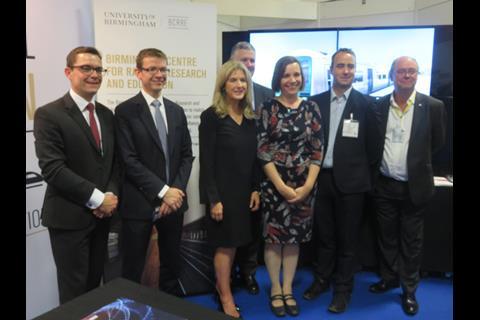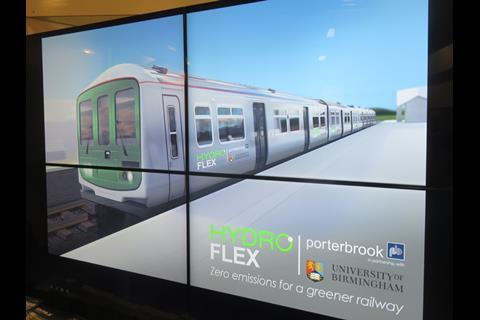UK: A memorandum of understanding for the development of a hydrogen fuel cell demonstrator train was signed by leasing company Porterbrook and the University of Birmingham’s Centre for Railway Research & Education at InnoTrans on September 19.
Porterbrook is to provide an ex-Thameslink Class 319 25 kV 50 Hz/750 V DC third rail electric multiple-unit for the Hydro Flex project. The partners expect it to be equipped with a fuel cell system and ready for demonstration runs in mid-2019. It would retain the ability to use electrical power.
Porterbrook CEO Mary Grant told Railway Gazette that the company was aiming to innovate and look ahead to what what the railway industry will need 30 years in the future.
While electrification is likely to remain the optimal approach for busy inter-city routes, cost and practicality mean that there will be a need for self-powered trains long into the future, believes Helen Simpson, Engineering Supplier Development Manager at Porterbrook, and this is likely to require a mix of traction types.
Much of the interest in hydrogen power is because of its potential as a means of energy storage, Simpson explained. It could help to smooth national demand for electrical power by enabling power generated off peak to be used to produce hydrogen for later use.
This means that early applications of hydrogen trains could be in areas where there is hydrogen production infrastructure in place for other purposes.
There are currently no acceptance procedures in place for approving hydrogen trains for use in the UK, Simpson said, but this is not expected to be a problem for the project as there is industry-wide interest in developing hydrogen technology.
BCRRE has already undertaken research into the potential use of fuel cells in rail operations, and has worked with a number of global rail businesses to identify potential opportunities.
A team from BCRRE recently demonstrated a narrow-gauge locomotive powered by a fuel cell.
‘Hydrogen powered trains offer a cleaner alternative to current diesel trains and this project demonstrates the opportunities and value of innovation in the rail industry’, said Dr Stuart Hillmansen, Senior Lecturer in Railway Systems.





